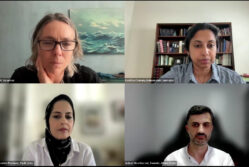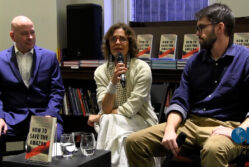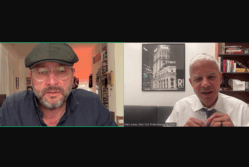Event Coverage Highlight

OPC Awards Dinner Highlights Journalists’ Exceptional Work in the Face of Threats and Risks
by Matthew Reysio-Cruz
Click here to see a page of photos and videos from the awards dinner.
Foreign correspondents gathered on April 21 to honor the best in international journalism after a turbulent year that brought the growing threats to democracy – and the profound risks faced by those who cover them – into sharp relief.
Keynote speaker Lulu Garcia-Navarro, a host of The New York Times’ Opinion podcast, made an impassioned plea at the Overseas Press Club’s Annual Awards Dinner for greater support of journalists’ mental health, speaking to the barrage of horror and grief many face in doing their work.
“As the world is entering this dangerous new era, we must cover it,” said Garcia-Navarro, who has spoken openly about suffering from post-traumatic stress disorder after reporting on conflict. “But we must also take care of the minds of the people who are covering it.”
OPC President Paula Dwyer conferred the yearly President’s Award on the staff of pro-democracy newspaper Apple Daily and its founder, Jimmy Lai, who was arrested in August 2020 after the passage of the widely condemned national security law in Hong Kong.
The office of the venerated – and now shuttered – Apple Daily was raided again in June 2021 by 550 armed policemen, who arrested the chief editor and five other executives. Dwyer commended Apple Daily’s “bravery and fortitude in the face of the Hong Kong government’s harassment.”
Simon Lee, a former staff member, was one of five who accepted the award. Taking to the podium amid a roaring standing ovation, Lee held up a copy of the paper’s final print edition and called on journalists to “continue to cover Hong Kong on our behalf, so people know what is going on.”
A candle was also lit in honor of journalists from Ukraine, Belarus and Russia who openly defied the erosion of press freedom in their countries. Special mention was given to Yuliya Slutskaya, the Belarusian journalist held without trial for eight months on manufactured tax-evasion charges.
“I can’t think of anyone who has put the principle of a free press ahead of her own personal safety and comfort more than Yuliya Slutskaya,” Dwyer said.
Dwyer also announced that since October, the OPC had raised $130,000 for Afghan journalists who had fled the Taliban and were now refugees in the U.S. A similar effort was launched on Thursday for journalists from Ukraine, Belarus and Russia who had been displaced or harmed.
As of Thursday, $32,000 had already been donated to the cause.
This year’s 22 OPC awards, chosen from among more than 500 entries for work published in 2021, included compelling and unexpected stories about the toll of the COVID-19 pandemic, crises from Myanmar to Yemen, and botched withdrawal of U.S. troops from Afghanistan.
The New York Times led the awards with four wins, while The Washington Post, Getty Images, Vice News and The New Yorker notched two each. Two projects received financial support from The Pulitzer Center on Crisis Reporting.
The prestigious Hal Boyle Award for best newspaper, news service or digital reporting from abroad was given to The New York Times for its coverage of the collapse of Afghanistan, which captured both the government’s tenuous hold on the country and the Biden administration’s failed exit.
“All of this was accomplished against the background of an unprecedented effort to exfiltrate Times reporters and Afghan staff from Kabul as the capital fell,” the judges said. “Taken together, it was a model of covering a complex story in a dangerous environment.”
A photographer from Getty Images who documented brutal military violence in Myanmar – and who remained anonymous as protection against retaliation – was honored with the Robert Capa Gold Medal Award for best photographic reporting from abroad requiring exceptional courage.
In his acceptance speech, the photographer spoke over his gripping images of the large-scale unrest in Myanmar. He called attention to the many journalists who had been arrested, detained and killed following the military coup in 2021.
The Lowell Thomas Award for best radio, audio or podcast coverage of international affairs was bestowed on Lauren Frayer, Sushmita Pathak, Didrik Schanche and Nishant Dahiya of National Public Radio for their coverage of the devastating wave of COVID-19 that swept India last spring.
“We were trying to survive the same crisis we were covering,” Pathak said in her acceptance speech. Frayer added that covering the story “became a coping mechanism for us.”
The David Kaplan Award for Best TV or video spot news reporting from abroad went to CNN’s Matthew Chance, Zahra Ullah and Jeffrey Kehl for their reporting on the “manufactured migrant crisis” in Belarus fueled by its autocratic leader, Alexander Lukashenko.
“CNN, which stayed with the story until its final denouement, succeeded in putting a human face on a violent geopolitical crisis and humanitarian tragedy,” the judges wrote in their citation.
The Edward R. Murrow Award for best TV, video or documentary interpretation of international affairs with a run time up to 30 minutes went to VICE News’ Isobel Yeung, Amel Guettatfi, Javier Manzano and Ahmed Baidar for their work, “Yemen’s Children of War.”
Accepting on behalf of the team, Yeung said in her speech that the documentary was evidence that “the most vulnerable” were being sacrificed in order for officials to “preserve their own power.” The award, she hoped, would call attention to the “overlooked, overshadowed” crisis in Yemen, one of the worst humanitarian disasters in history.
A perennial favorite, the Best Cartoon Award, was awarded this year to the Las Vegas Review-Journal’s Michael Ramirez.
“It is rare to find a cartoonist who deftly creates both dark moods and light humor with such skill and intelligence,” the judges said. “His work effectively eviscerates sacred cows and makes us laugh, even as we sometimes grumble.”
In his speech, Ramirez highlighted journalists’ duty to expose injustice and called attention to the myriad ways that international events ripple through the United States, too.




